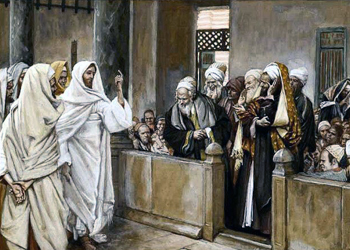14 But the Pharisees went out and took counsel against him, how to destroy him. 15 Jesus, aware of this, withdrew from there. And many followed him, and he healed them all, 16 and ordered them not to make him known. 17 This was to fulfill what was spoken by the prophet Isaiah: 18 “Behold, my servant whom I have chosen, my beloved with whom my soul is well pleased. I will put my Spirit upon him, and he shall proclaim justice to the Gentiles. 19 He will not wrangle or cry aloud, nor will any one hear his voice in the streets; 20 he will not break a bruised reed or quench a smoldering wick, till he brings justice to victory; 21 and in his name will the Gentiles hope.”
Meditation: How do we achieve success and victory in our lives? In everyone’s life there are key moments or turning points on which the whole of one’s life hinges. The mounting confrontation between the Pharisees and Jesus was such a decisive event and crisis. The religious leaders became intolerant of Jesus because of their prejudice. Nothing that Jesus would do or say from this point on would be right in their eyes. They conspired, not simply to oppose Jesus but to eliminate him.
Courage and determination to do God’s will
Jesus met this defiance with courage and determination to do his Father’s will. He used the crisis to teach his disciples an important lesson for God’s way to success and victory. The only way to glory in God’s kingdom is through the cross – the cross of suffering and humiliation – which Jesus endured for our sake and for our salvation. We, too, are called to take up our cross every day – to die to sin, selfishness, envy, pride, strife, and hatred – and to lay down our lives in humble service and love for one another, just as Jesus did for our sake.
Matthew quotes from the “Suffering Servant” prophecies of Isaiah to explain how Jesus the Messiah would accomplish his mission – not through crushing power – but through love and sacrificial service (Isaiah 42:1-4). In place of a throne Jesus chose to mount the cross and wear a crown of thorns. He was crucified as our Lord and King (John 19:19; Philippians 2:11) There is no greater proof of God’s love for us than the sacrificial death of his only begotten Son for our sake and our salvation (John 3:16).
Jesus died not only for the Jews but for all the Gentile nations as well. Isaiah had prophesied centuries before, that the Messiah would bring justice to the Gentiles. To the Greek mind, justice involved giving to God and to one’s fellow citizen that which is their due (whatever is owed to them). Jesus taught his disciples to give God not only his due, but to love him without measure just as he loves us unconditionally – without limits or reservation.
Justice tempered with love and mercy
Jesus brings the justice of God’s kingdom tempered with divine love and mercy. He does not bruise the weak or treat them with contempt, but rather shows understanding and compassion. He does not discourage the fainthearted but gives hope, courage, and the strength to persevere through trying circumstances. No trials, failings, and weaknesses can keep us from the mercy and help which Jesus offers to everyone who asks. His grace is sufficient for every moment, every situation, and every challenge we face. When you meet trials and difficulties, do you rely on God’s help and grace?
Lord Jesus, your love and mercy knows no bounds. Give me strength when I am weak, hope when I am discouraged, peace when I am troubled, consolation when I am sad, and understanding when I am perplexed. Make me an instrument of your love and peace to those who are troubled and without hope.
Psalm 136:1,10-15,23-24
1 O give thanks to the LORD, for he is good, for his steadfast love endures for ever.
10 to him who smote the first-born of Egypt, for his steadfast love endures for ever;
11 and brought Israel out from among them, for his steadfast love endures for ever;
12 with a strong hand and an outstretched arm, for his steadfast love endures for ever;
13 to him who divided the Red Sea in sunder, for his steadfast love endures for ever;
14 and made Israel pass through the midst of it, for his steadfast love endures for ever;
15 but overthrew Pharaoh and his host in the Red Sea, for his steadfast love endures for ever;
23 It is he who remembered us in our low estate, for his steadfast love endures for ever;
24 and rescued us from our foes, for his steadfast love endures for ever;
Daily Quote from the Early Church Fathers: The Savior’s meekness, by John Chrysostom (347-407 AD)
“The prophet celebrated in advance both the Savior’s meekness right alongside his unspeakable power. Thereby he opened to the Gentiles a great and effective door. Isaiah also foretold the ills that were to overtake the Jews. He foreknew the Son’s oneness with the Father: ‘Israel is my chosen, my soul has accepted him; I have put my Spirit upon him’ (Isaiah 42:1). For it is not as an adversary that Christ transcends the law, as if he were an enemy of the Lawgiver, but as though he were of one mind with the Lawgiver and held to the very same purposes. Then, proclaiming the Lord’s meekness, Isaiah said, ‘He shall not cry nor lift up his voice’ (Isaiah 42:20). For his desire indeed was to enable healing in their presence. But since they pushed him away, he did not contend any further against their opposition.” (excerpt from THE GOSPEL OF MATTHEW, HOMILY 40.2.1)







